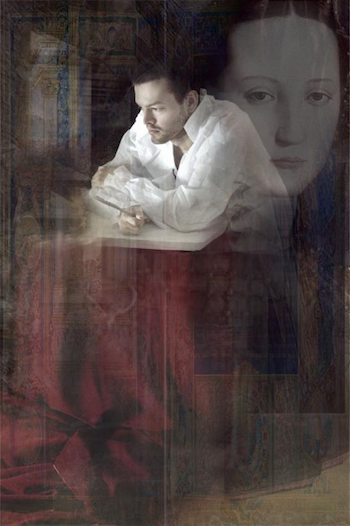Stephen Barlow’s new production of La
bohème does just that, however, relocating the action to that very
same period. Indeed, I notice that the RSC’s Props Department is credited
in the programme for ‘their co-operation and contribution’. Andrew
D Edwards’s designs look gorgeous: both sets, making excellent use of the
Holland Park stage and environment, and costumes.
What are we to make of such a move? Not having asked Barlow and that,
perhaps, not being entirely the point in any case, I shall, without implying
‘intention’, say a little about what I made of it, or thought one
might make of it. One could, I suppose, say that it does not matter, say what
‘we’ often say about the time and period, that in some respects, at
least, it is the least interesting aspect of a production. That, I think, would
be a half-truth, but a half-truth nevertheless. I doubt many of us would be
complaining if an opera set in Tudor England were convincingly updated to
nineteenth-century France, and certainly not to the present day, although we
might well ask why, and with what success. Why there and then, in that case?
For me, the immediate resonance was with Shakespeare’s London. Rodolfo,
our poet, perhaps something of ‘Will’ about him: perhaps more
Shakespeare in Love than Shakespeare ‘himself’, but how
much do we know of the latter anyway? A leather doublet becomes him, as does
distraction from his quill. Given not only the poetical but metatheatrical
concerns of the work, I wondered whether, following the first or even the
second act, we should discover that it had all, or partly, been a play within a
play, or some such device, but no — with the possible exception of the
decidedly, deliberately artificial device of casting snow upon the scene in the
third act. Perhaps that is the point, or at least could be made to be the
point: we are all metatheatrical now, we all create our own metatheatre, even
when something is apparently played ‘straight’. That, I think, is
undeniable, although I suspect the particular relocation is, at any rate, not
entirely arbitrary. Shakespeare’s London, or our creation of it, speaks
to an English audience as strongly as pretty much any other possibility.
Perhaps the justification is that: we know it, or think we know it, and thus
we find it easier to explore. I have no problem in principle with exchanging
Montmartre and a Southwark tavern. It was all rather fun, and genuinely
surprising. Other productions might delve deeper — although, frankly,
very few do. Not everything can be directed by Stefan Herheim, whose Oslo
staging is in a class of its own. This works well, on its own terms. The
enigmatic programme quotation from Two Gentleman of Verona —
which I only saw afterwards — might speak for itself, then, so long as we
do not start silly gushing about alleged ‘timelessness’. Nothing is
timeless; nor is it helpful or interesting to consider it so. ‘Oh, how
this spring of love resembleth/The uncertain glory of an April day/Which now
shows all beauty of the Sun/And by and by a cloud takes all away.’ We are
free, then, to consider correspondences and connections insofar as we wish.
Having a young cast of such considerable theatrical ability helps. Rarely
has the sexual attraction between Mimì and Rodolfo seemed so evident. Anna
Patalong offers a beautifully sung, clearly heartfelt performance. It would
take a sterner heart than mine not to root for her. Shaun Dixon sometimes sang
out a little too much for my taste, but the acoustic can be a tricky one. There
was certainly no doubting his commitment, nor his idiomatic command. Andrew
Finden’s Marcello was intelligent, thoughtful, impetuous: the quicksilver
quality of his exchanges with Elin Pricthard’s gloriously charismatic
Musetta, every inch the self-conscious stage queen, yet most genuine in concern
and charity at the close, would have been worth the price of admission alone.
Frederick Long and John Savournin made at least as much of Schaunard and
Colline as any artists I can recall. The sense of student camaraderie can
rarely, if ever, have been so strong; nor can the dangers of that play-acting
which ultimately fails our tragic heroine. David Woloszko’s Falstaff-like
Benoît was not only an obvious comic turn, but very well sung too, as
indeed were all of the ‘smaller’ roles’.
The OHP Chorus and Children’s Chorus were, quite simply, outstanding.
Barlow’s work with them had clearly been thoroughly internalised. They
knew what they were supposed to do, and did it, without ever seeming
over-rehearsed. Vocally, one could hear every word, and in a coherent musical
whole too. Matthew Waldron’s conducting doubtless helped greatly in that
respect. There was never the slightest danger of sentimentalisation, in a
sharp-edged account, which kept the excellent City of London Sinfonia on its
toes throughout. I was surprised how little, if at all, I missed a larger body
of strings; in a fine performance, one’s ears (almost always) adjust. It
was not all so driven, though; where the music needed, wanted to dance, it
could do so happily, not least during Musetta’s second-act
‘show’. There would be no harm in relaxing a little as the run
progresses; by the same token, however, there is nothing to complain about, and
a great deal to savour, here. OHP’s Puccini Midas touch works its magic
once again.
Mark Berry
Cast and production details:
Mimì: Anna Patalong; Rodolfo: Shaun Dixon; Marcello: Andrew
Finden; Musetta: Elin Pritchard; Schaunard — Frederick Long; Colline:
John Savournin; Benoît: David Woloszko; Alcindoro: James Harrison;
Parpignol: Michael Bradley; Customs Sergeant: Alistair Sutherland. Director:
Stephen Barlow; Designs: Andrew D Edwards; Lighting: Howard Hudson. Opera
Holland Park Children’s Chorus and Chorus (chorus masters: Scott Price
and Richard Harker/City of London Sinfonia/Matthew Waldron (conductor). Holland
Park Theatre, London, Saturday 11 June 2016.
